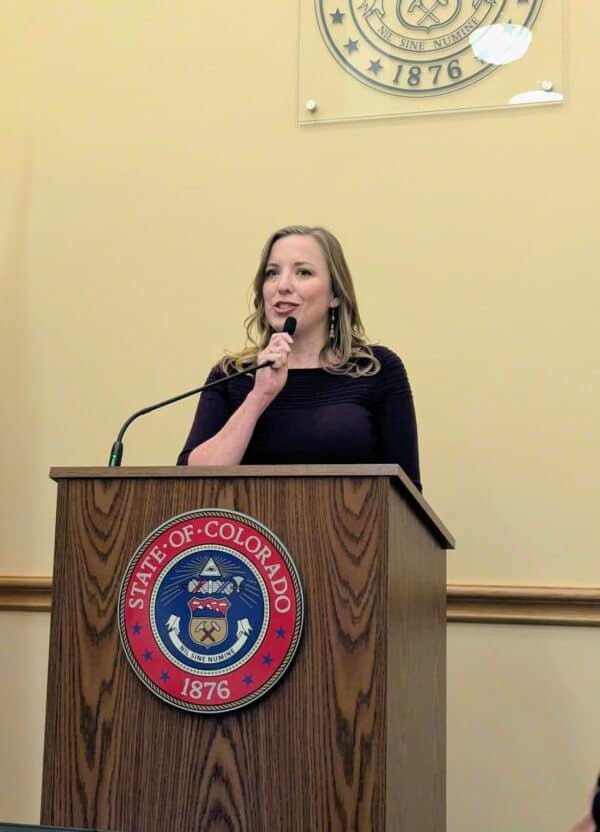How One Insurer Is Blocking Access to Breakthrough Medications
May 6, 2025 | by ltcinsuranceshopper

Amanda Boone will never forget the day in 2019 when she heard that the U.S. Food and Drug Administration (FDA) had given accelerated approval to a drug that the agency designated as “a Breakthrough Therapy” for treating cystic fibrosis, or CF, the rare and debilitating illness that afflicts Boone and about 40,000 other Americans.
“My pharmacist – I mean, when you have this disease your pharmacist is like your family – called me and said I’ve got this box here waiting for you,” Boone, the founder of Colorado-based CF United, recalled. She immediately drove two hours to Denver to pick up one of the first approved shipments of the medicine called Trikafta, and even posed for a celebratory photo with her druggist.
The new, FDA-approved medicine was a life changer. “My body started immediately overhauling,” recalled Boone, who at that time was under consideration for a lung transplant after multiple hospitalizations for breathing difficulties. “I took a deep breath for the first time in a decade. I forgot what it felt like.” In the six years since Trikafta’s approval, she’s stayed out of the hospital. Her recovery from severe weight loss “has been life altering for me – and my story’s not unique.”
The impact of FDA approval for Trikafta for Boone, and for many of the CF patients she fights for, helps explain why health care advocates – especially in the communities dealing with rarer diseases like CF – are alarmed at a new policy announced recently by a major insurance carrier, Independence Blue Cross and Blue Shield.
Independence Blue Cross, known as IBX in the greater Philadelphia region it primarily serves, says it won’t cover the cost of most new medicines that receive an accelerated FDA approval for a minimum of 18 months, until additional testing is available.
Accelerated approval is a pathway frequently used with drugs targeting rare diseases. Currently, IBX is the only major insurer to propose such a stringent new policy, but advocates for expanded health care are worried the concept could spread as the industry looks for new ways to keep costs low and profits high.
Critics note that for patients with the illnesses that would most likely be affected by such a policy, such as Duchenne muscular dystrophy (DMD), amyotrophic lateral sclerosis (ALS) and Fabry disease, 18 months might not only delay a chance for a better life, but could make the difference between life and death.
“This shows how plans are moving away from care optimization and toward revenue optimization,” said Peter Rubin, the executive director of No Patient Left Behind, a nonprofit that advocates for expanded health care access and affordability. While many experimental drugs are expensive, they also can mitigate the need for hospitalizations or other costly interventions down the road when a patient is sicker, perhaps needlessly so.
Rubin called the new policy “an insidious trend” – tied to other controversial practices such as the increased demand for prior authorization of prescriptions or procedures, aimed at reducing insurers’ costs, rather than improving care. NPLB supports an April letter from the Little Hercules Foundation and other rare-disease organizations in urging IBX to reverse the policy, which took effect on Jan. 1, and also appealing to state regulators in Pennsylvania and New Jersey to intervene.
Independence Blue Cross replied to the criticisms with a lengthy statement that defended its practices and cited a long history of covering newly approved medication for a wide range of illnesses and conditions, especially cancer. But the Philadelphia-based insurer also insisted that it needs to see more proof that a new drug is effective than the FDA currently requires for many pharmaceuticals in the agency’s accelerated pipeline.
IBX claimed in its statement that “there are a small number of drugs and therapies with a lack of acknowledged clinical benefit that the FDA has nonetheless granted accelerated approval for. To ensure that our members receive treatments that are truly safe and effective in treating their diagnosis or condition, IBX has always had a non-coverage position for these few drugs based on the fact there is no research proving they are clinically effective.” It insisted that coverage could begin before the 18-month window upon additional studies that confirm the FDA’s initial decision.
The statement from IBX said it supports the concept of federal accelerated approval but also asserts that “it does not guarantee that drugs are safe or effective.” It cited one particular case – Aduhelm, Biogen’s once-promising treatment for Alzheimer’s disease that won FDA accelerated approval in 2021 but failed to meet expectations and was taken off the market three years later.
The IBX statement drew a stinging rebuke from Paul T. Kim, a top D.C.-based food and drug attorney and a former congressional staffer who is a member of No Patient Left Behind’s innovation council. He said, “The policy is founded on an unwarranted, arrogant second-guessing of FDA’s scientific judgment of new drug safety and effectiveness.” Kim added that while FDA approval isn’t a foolproof guarantee of success, the agency’s practices are a “global gold standard” for bringing desperately needed new medications onto the market.
“IBX is treading a slippery slope, which leads inevitably to even broader, arbitrary coverage exclusions premised on a health insurer’s preferences or biases – not clinical evidence nor independent evaluations of such evidence,” Kim wrote. He added that the IBX assertion that some drugs winning FDA accelerated approval are not effective is simply “untrue.”
The insurer’s policy change received a much more lukewarm response from the Pennsylvania Department of Insurance. An agency spokesperson said, “IBX’s updated language in the 2025 policy did not represent a change in coverage but merely clarified the definition of limitations and exclusions that were already present; there was no ‘change’ to approve.”
The FDA created its accelerated approval process in 1992, at the height of the HIV/AIDS crisis, as a means to speed access to potential treatments for a disease that was killing thousands of Americans every year. The medications approved through the faster process are credited with making AIDS a manageable illness for most patients today, and those with other rare diseases often pin their hopes on drugs that are under consideration in the same FDA program.
Breakthrough medications for the relatively small number of patients coping with rare diseases are difficult to bring to market. Not only is it easier to conduct large trials on drugs for more common diseases, but the pharmaceutical industry also has less profit incentive.
Dr. Michael Sherman, currently a venture partner at RA Capital Management and formerly chief medical officer for Harvard Pilgrim Health Care, said he was “stunned” to learn about the new IBX policy, and not only because of the national debate over insurance company practices in the aftermath of the tragic murder of the CEO of UnitedHealthcare.
“It’s highly unusual for the moment for a health plan to come out with a policy like that because it seems indefensible,” Sherman said. “It would never have occurred to me to do something along those lines.”
The letter that the Little Hercules Foundation-led group sent to IBX and state leaders says there are 28 potentially life-altering or life-saving medicines currently in the FDA accelerated approval pipeline. It argues that novel drugs have played a critical role in the 29% reduction in cancer death rates from 1992 to 2017, and that it’s wrong to deny patients with rare diseases the same opportunity. It notes: “Rare disease patients deserve the same groundswell of innovation, which is only possible if patients can access the treatments once FDA-approved.”
But Sherman pointed to signs that employers are increasingly looking for ways to rein in costs as expensive yet possibly life-saving drugs become available. Recently, a woman in Kansas gave birth to twin boys with a rare disease, spinal muscular atrophy, and was told they probably wouldn’t survive past age 2 without a gene therapy drug called Zolgensma that would have cost a total of $4.2 million, Sherman said. Her employer, a hospital company, dropped coverage for the drug, but soon agreed to a novel way to pay for it after negative publicity. He said that actions like the IBX policy, if adopted by other insurers, could be seen as a way to reduce exposure to such scenarios.
Critics of the new IBX rules call attention to an unusual loophole: The 18-month waiting period doesn’t apply to new cancer drugs, essentially creating two different classes of diseases. In its letter appealing the IBX rule, No Patient Left Behind noted that it’s easier to conduct clinical trials for oncology drugs than for the rare diseases whose patients would be most harmed.
“Cancer trials often measure survival or tumor reduction, outcomes which can be
measured in a short time period,” Rubin said. “Many rare diseases are slow progressing, necessitating longer confirmatory trials, so measuring clinical function in a slowly progressing disease can take years.”
That’s why the 18-month lag proposed by IBX might seem like an eternity to patients with a disease such as cystic fibrosis, including those that Colorado’s Boone continues to fight for while they wait for new treatments to better manage their condition. She said that while Trikafta has improved daily living for her and thousands of other CF patients since its FDA approval, 10 to 12% of CF patients don’t respond well to that drug, and are awaiting new medicines now in the pipeline.
“We’re monitoring it all the time,” Boone said. “A new drug just came out, and we attended a drug utilization review board meeting on it with Medicaid in my state. We go to the FDA meetings.” That’s why the notion that a major U.S. insurer could tack on an additional 18-month waiting period – or that other insurers or companies or government plans could follow their lead – is devastating to this CF activist.
“I’m not blind to the fact that things are changing,” Boone said. “I’ve been seeing it with these payers, and, yes, they’re starting to push back against the high cost.” She said she’d like to see a comprehensive solution to the astronomical prices for pharmaceuticals in the United States, but in the meantime, patients with serious illnesses and little time to spare are caught in the middle.
RELATED POSTS
View all






